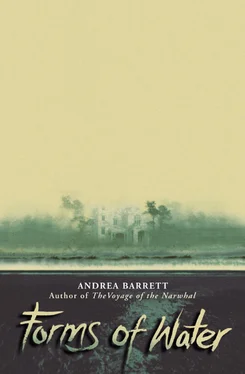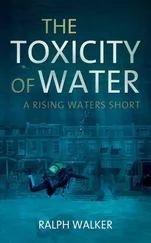To his surprise, Marcus broke into a huge smile. “Isn’t that something, now. Used to be, there was a big box factory in Pomeroy that your father worked at in the winter. When they moved it to Athol, after the building started, he commuted out there. It’s nice to think you’re following after him.”
“I didn’t know I was.” Henry looked in the rearview mirror and caught Brendan’s gaze; Brendan dropped his eyes, leaving Henry to wonder why he’d never mentioned this. Then he wondered what else Marcus knew that Brendan didn’t, or hadn’t seen fit to mention.
They drove along the base of a long, low hill and crossed a river that was, Marcus said, one of the three that fed the reservoir. On the other side of the river was a quiet town that seemed very old. Henry turned where Marcus told him to, and the road, already small, narrowed further and became frost-heaved and rocky.
“You want to take a right at this fork,” Marcus said. “Then you’ll have to be careful — the last stretch is dirt.”
Marcus knew about the place where his father had worked, Henry thought. Perhaps he knew more than that. “What happened to my father during the war?” he asked. “Did he ever say?”
“You must have heard that story before.”
“Not from you. You knew him.” Henry saw Brendan lean forward in his chair, as if to catch Marcus’s words, and he remembered how Brendan had lain in the parlor in Coreopsis, telling him stories about the war in China. Those tales had come from the same time and the same war but a different place; although Henry had clung to them, they had never done more than circle around his father’s war.
“I was with him,” Marcus said. “But it’s a long story.”
“Tell me,” Henry said.
Marcus drew his arms together in his lap. “War stories,” he said sourly. “I hate war stories.” But then he stretched his arms out on his knees and gazed into his open palms, as if the words Henry wanted were written there.
“Nothing went right for us,” he began. His voice was distant and cold, and Henry saw that the skin inside Marcus’s elbows was as crinkled and fragile as Brendan’s. He checked his own arms quickly; the skin was creased but firm.
“We’d both joined the National Guard before Pearl Harbor, and our unit got called up in March of ’42. They shipped us over to Oahu for training, and to serve as part of the base defense force. We didn’t see combat until November of ’43, when they shipped us over to the Gilbert Islands. A place called Makin.”
“I remember that name,” Henry said. “I used to have a map—” But before he could say another word, Marcus rushed ahead as if he couldn’t stop.
“We didn’t know what we were doing,” said Marcus. “And our officers were as green as us. We outnumbered the Japs there ten to one and they didn’t have any heavy guns, but we didn’t know that — we got pinned down by a handful of snipers screaming curses at us and tossing lit firecrackers and yelling from the trees. We couldn’t move. We couldn’t sleep. We thought there were thousands of them. Some of us got so scared we fired into the dark, just to be shooting at something, and then the Japs would see where we were and start firing back at us. So we’d try to stay calm, but then a couple more guys would get hysterical and give away our positions again, and then the Japs would sneak up and pounce on our foxholes.” Marcus paused for a deep, shaky breath.
“Is that what made my father so crazy?” Henry said. “Was he one of the ones who fired?” He couldn’t really picture the scene, but he could imagine the shame: he’d been living with the shame of failure for months.
“No,” Marcus said. “He did all right. But it took us four days to clear Makin, and by the time we were done, a Jap sub had reached the atoll and it sunk one of the escort carriers our last day there. A torpedo exploded the bombs in the hold and the carrier blew up. Men, planes, clothing, everything everywhere — hundreds of men were killed and almost all the rest had horrible burns. Then all the naval officers started saying how there hadn’t been that many Japs on the atoll, and how we’d taken four days to do a two-day job, and that if we’d finished when we should have, the carrier never would have been hit. It was our fault, they said. Those men died because we didn’t know what we were doing.”
He paused again. “Pricks,” he said bitterly, and then he went on to tell Henry how their unit had gone back to Oahu under a cloud. The plans for the invasion of Saipan had been under way by then, and the men were thrown back into training with no rest at all. No one believed they’d see action again so soon.
“What a mess,” Marcus said. The Marine landings went badly; the tide was too low, the channel too crowded, the amphibious tractors and tanks got stuck on the beaches. Marcus’s unit was landed two days later, to back up the Marines. They lost most of their equipment during the landing, and then one disaster had followed another.
“The Marines were moving north,” Marcus said. “Through the center of the island. The commander threw us into the middle of the line, between the two Marine divisions, and he ordered us to sweep through this place called Death Valley.” Marcus moved his hands in the air as he talked, sketching a map along the dashboard and windows as he tried to explain how the valley floor was bare of cover and how the cliffs along the sides were riddled with enemy gun positions.
“They made mincemeat out of us,” he said, chopping at the air. “We couldn’t keep up with the Marines on our sides, who were in much better positions. The line got bent like this,” he said, making an arc with his hands. “Us in the middle, almost a mile behind the Marines on our flanks. The Marines had to wait for us and the brass had a fit. The commander — a Marine, of course — was telling everyone we couldn’t fight, or wouldn’t fight, that we were inferior. Useless, he said. Too old, poorly trained. Our officers didn’t know what they were doing and turned tail when things got tough.
“We didn’t know what we were doing, and our officers couldn’t lead horses to water, but we fought. We fought hard. And all we got for it was shit.”
His voice rose, cracked, quivered, and Henry realized how old Marcus was, and how long ago all this had happened.
“We were stuck in some places for days. Men dying all around us, all of us worn-out and hungry and thirsty and running out of supplies and ammunition, no one helping us and everyone saying what a bunch of no-good failures we were. We couldn’t link up with the Marines on our flanks for a week. You can’t begin to understand the kind of tired we were. In the end we lost as many men as the Marines, but the Marines got all the glory and we took all the blame.
“The story got into the newspapers and there was a big investigation. The Marines said the Army guys were bums, and the Army said the Marine commanders had given the Army troops the worst jobs and sacrificed them. Everyone was arguing about who should have commanded who and how, and they all lost sight of us. All the men we’d lost, all the men who went home missing arms and legs and eyes — that counted for nothing. The men who’d acted like heroes weren’t heroes. They were the guys who’d been too slow at Makin and been responsible for the sinking of a ship, and then too slow again at Saipan.”
Marcus smacked his hand against the dashboard. His hand was wrinkled and spotted and gnarled and had no more strength, Henry guessed, than a child’s, but the vinyl shell was brittle and it split in a sudden star of cracks. “Damn,” Marcus said. “I’m sorry.”
“Don’t worry about it. It’s not mine. No wonder my father was bitter.” That was the point, Henry thought, of this bloody story. That his father had been falsely blamed for something he couldn’t help. He thought he knew how his father had felt.
Читать дальше












